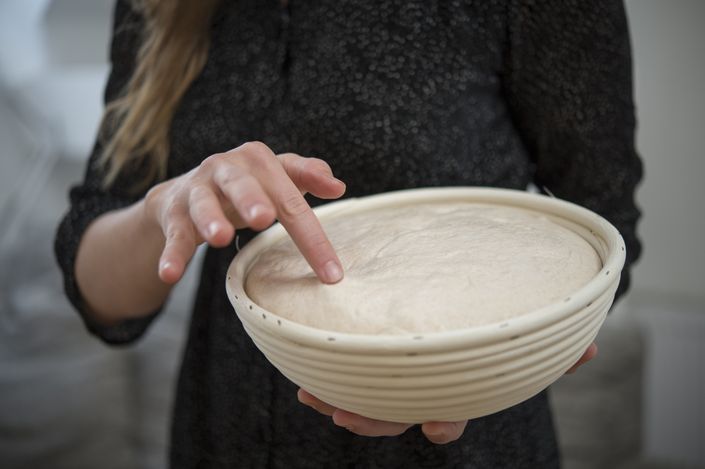
Sourdough
Doughs, Loaves, Flatbreads & Cakes
In this course you will learn how to work with a sourdough culture to make beautiful loaves of bread, yes bread, and with different kinds of flours and with various techniques, but also pitas, pizza dough and pancakes! Always using a natural fermentation process.
At the same time the course explains why sourdough products compared to to other types of (industrial) baking are easier to digest, make the grains' nutrients more bioavailable, and stay so tasty so much longer.
Don't worry about being an expert. Bread baking is one of the most wonderful skills to learn! We will start from the sourdough culture and build your bread baking skills with all the supplies you have already at home.

Sourdough
Doughs, Loaves, Flatbreads & Cakes
Course Curriculum
-
StartIntroduction to Sourdough Bread (0:26)
-
StartBenefits of Sourdough Bread (2:16)
-
StartFeeding Sourdough (0:35)
-
StartFloat Test (0:27)
-
StartSALT - which one is best? (0:47)
-
StartTutorial - How to make Sourdough Bread (21:24)
-
StartFlour Types and Varieties – discovering your bread baking possibilities
-
StartTaking Care of your Starter Culture (23:15)
-
StartWhat the HOOCH is that? (0:37)
-
PreviewCloser Look at Stretching & Folding (1:12)
-
PreviewLamination (1:17)
-
StartScoring (0:48)
-
StartThe BIG LOAF - the regular recipe 3X (0:10)
-
StartAdjusting the Sourness in Your Sourdough
-
StartSourdough Pancakes and Pita Breads
-
StartSourdough Cinnamon Buns
-
StartSourdough Cake - Yes... CAKE!
-
PreviewSourdough Waffles
-
StartInjera - Ethiopian Flat sourdough bread
-
PreviewSourdough Focaccia (1:31)
-
StartUse every last CRUMB! What to do with extra, imperfect or stale Sourdough
-
StartPie Crust (1:04)
-
StartSourdough Seed Crackers - using fresh or flat starter (0:47)
-
StartSourdough Pan Bread (0:57)
-
StartSprouted Grain Muffins
-
StartSourdough Croissants (0:16)
-
StartChriststollen (German Christmas Loaf)
-
StartSourdough Chapati
-
StartSourdough Pizza Doughs and Crusts
Frequently Asked Questions
Your Instructor

Alexis first stepped into the world of fermentation in Mozambique. Her stomach was struggling to cope with all the foods her body was not accustomed to. Locals urged her to place her trust in fermented corn drink, called Maheu, claiming it would help her digestive system acclimatize to the foreign bacteria. Always open to try new things, she took their advice and realized that there was more to this sour, tangy drink than she thought. Eight years later, she’s travelled to 43 countries and counting and her gut’s microbiome is the core of her calling. She has collected techniques, understandings and the bacteria and yeasts themselves in order to share the traditional practices of fermentation through interactive workshops, webinars, and online courses. Alexis has studied gut-health and explains the link of the gut-brain connection through the use of fermented foods. She gets her participants to relook at the good old saying 'you are what you eat' (or rather 'you are what you digest') as well as 'follow your gut feeling'.
Why Edible Alchemy?
Edible - you can eat it, and Alchemy - the same philosophy as the alchemists; turning normal things into gold! Here at Edible Alchemy, we change basic foods into more valuable foods. For example, fermented foods are more valuable in their taste. Think of how a normal cabbage can turn into a rich sauerkraut or kimchi. Fermented foods are also more valuable in the amount of time they can last and can be even stabler than their raw ingredients. Aged cheddar anyone? Depending if you are making of buying ferments, we can see fermented foods also are simply more valuable in terms of price in most cases, such as a bunch of grapes that ferment into a bold, round wine. Depending on your desired outcomes, fermented foods can have an appreciable amount of alcohol, which if that is your goal, they too become valued in these qualities. lastly, but not at all least, fermented foods are valuable in nutritional benefit for our bodies!
Fermented foods are nutrient dense foods, which means PACKED with vitamins, nutrients and often with probiotics which help us breakdown our foods better, gain energy, strengthen our immune systems and better our digestions. That's only the tip of the iceberg here. Check out more throughout the courses we have here and see what tantalizes your tastebuds and makes your microbiome (your internal fermentation vessel) get excited and happy!
Use the skills you learn in this course to expand to other recipes you find along the way. The most important thing here with sourdough is that you treat your starter well and use it/him/her (best to give it a name!) when it is at its most active point! Once we have learnt this, we can do so much! Join us to expand your knowledge horizons on sourdough bread baking!
